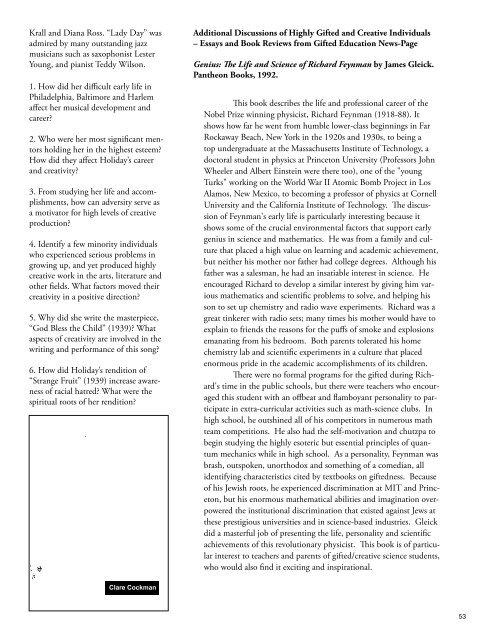Torrance Journal for Applied Creativity
TorranceJournal_V1
TorranceJournal_V1
You also want an ePaper? Increase the reach of your titles
YUMPU automatically turns print PDFs into web optimized ePapers that Google loves.
Krall and Diana Ross. “Lady Day” was<br />
admired by many outstanding jazz<br />
musicians such as saxophonist Lester<br />
Young, and pianist Teddy Wilson.<br />
1. How did her difficult early life in<br />
Philadelphia, Baltimore and Harlem<br />
affect her musical development and<br />
career?<br />
2. Who were her most significant mentors<br />
holding her in the highest esteem?<br />
How did they affect Holiday’s career<br />
and creativity?<br />
3. From studying her life and accomplishments,<br />
how can adversity serve as<br />
a motivator <strong>for</strong> high levels of creative<br />
production?<br />
4. Identify a few minority individuals<br />
who experienced serious problems in<br />
growing up, and yet produced highly<br />
creative work in the arts, literature and<br />
other fields. What factors moved their<br />
creativity in a positive direction?<br />
5. Why did she write the masterpiece,<br />
“God Bless the Child” (1939)? What<br />
aspects of creativity are involved in the<br />
writing and per<strong>for</strong>mance of this song?<br />
6. How did Holiday’s rendition of<br />
“Strange Fruit” (1939) increase awareness<br />
of racial hatred? What were the<br />
spiritual roots of her rendition?<br />
Additional Discussions of Highly Gifted and Creative Individuals<br />
– Essays and Book Reviews from Gifted Education News-Page<br />
Genius: The Life and Science of Richard Feynman by James Gleick.<br />
Pantheon Books, 1992.<br />
This book describes the life and professional career of the<br />
Nobel Prize winning physicist, Richard Feynman (1918-88). It<br />
shows how far he went from humble lower-class beginnings in Far<br />
Rockaway Beach, New York in the 1920s and 1930s, to being a<br />
top undergraduate at the Massachusetts Institute of Technology, a<br />
doctoral student in physics at Princeton University (Professors John<br />
Wheeler and Albert Einstein were there too), one of the "young<br />
Turks" working on the World War II Atomic Bomb Project in Los<br />
Alamos, New Mexico, to becoming a professor of physics at Cornell<br />
University and the Cali<strong>for</strong>nia Institute of Technology. The discussion<br />
of Feynman's early life is particularly interesting because it<br />
shows some of the crucial environmental factors that support early<br />
genius in science and mathematics. He was from a family and culture<br />
that placed a high value on learning and academic achievement,<br />
but neither his mother nor father had college degrees. Although his<br />
father was a salesman, he had an insatiable interest in science. He<br />
encouraged Richard to develop a similar interest by giving him various<br />
mathematics and scientific problems to solve, and helping his<br />
son to set up chemistry and radio wave experiments. Richard was a<br />
great tinkerer with radio sets; many times his mother would have to<br />
explain to friends the reasons <strong>for</strong> the puffs of smoke and explosions<br />
emanating from his bedroom. Both parents tolerated his home<br />
chemistry lab and scientific experiments in a culture that placed<br />
enormous pride in the academic accomplishments of its children.<br />
There were no <strong>for</strong>mal programs <strong>for</strong> the gifted during Richard's<br />
time in the public schools, but there were teachers who encouraged<br />
this student with an offbeat and flamboyant personality to participate<br />
in extra-curricular activities such as math-science clubs. In<br />
high school, he outshined all of his competitors in numerous math<br />
team competitions. He also had the self-motivation and chutzpa to<br />
begin studying the highly esoteric but essential principles of quantum<br />
mechanics while in high school. As a personality, Feynman was<br />
brash, outspoken, unorthodox and something of a comedian, all<br />
identifying characteristics cited by textbooks on giftedness. Because<br />
of his Jewish roots, he experienced discrimination at MIT and Princeton,<br />
but his enormous mathematical abilities and imagination overpowered<br />
the institutional discrimination that existed against Jews at<br />
these prestigious universities and in science-based industries. Gleick<br />
did a masterful job of presenting the life, personality and scientific<br />
achievements of this revolutionary physicist. This book is of particular<br />
interest to teachers and parents of gifted/creative science students,<br />
who would also find it exciting and inspirational.<br />
Clare Cockman<br />
53


